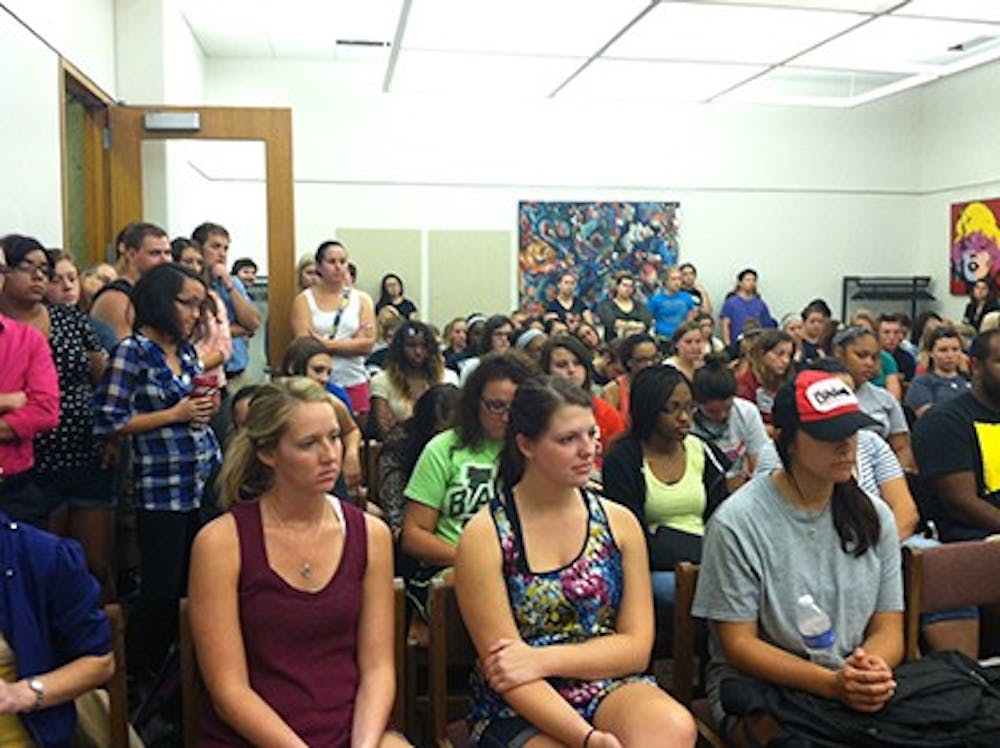Spurred partly by derogatory tweets by the former Student Government Association president, students met Thursday to participate in a panel discussion about diversity.
The panel consisted of advisory board member of the Peace Center Beth Messner, associate provost of diversity Charlene Alexander and Gunnar Orn Ingolfsson, a doctoral student from Iceland. Social Justice League collaborated with the Center for Peace and Conflict Studies to host event.
In promotional emails, it was indicated a representative from SGA would be a part of the panel, and an SGA member was mentioned as one of the panel members in a promotional email sent early Thursday morning. However, no slate member was present.
Panel mediator for Social Justice League Matt Smith said SGA originally responded affirmatively to sending a representative.
“I think it was some sort of miscommunication,” he said. “They originally said they would be sending someone but today we got a message saying they would not be sending one.”
SGA media contact Chris Jones attributed communication issues to SGA’s absence.
Jones said the executive board made a decision to send a member of the executive board when they were first approached, but no time or place was discussed. None of the members were able to attend today.
“Between that meeting and earlier today that decision was not understood by both parties,” he said. “We wouldn’t want to send someone [not affiliated with the executive board] into a question and answer session.”
During the discussion, the panelists covered race issues like hate speech, micro aggression and developing personal consciousness.
After half an hour of moderator-driven questions, students took over and filled the rest of the hour with their questions.
Messner said in an academic sense, Malachi Randolph’s tweets are considered hate speech. She said she found the fact that the texts came from a student leader the most troubling.
“It opens up a larger conversation,” Messner said. “[There are] people who don’t set out to engage in acts of oppression and it swings to the other end of the continuum, where there are organized hate groups.”
Alexander encouraged students to move beyond the tweets and confront their own racial biases.
“It’s painful to look at our history, to acknowledge that racism still exists today,” she said. “It’s painful when we ourselves have racist thoughts. It’s easy to avoid [thinking about it] but developing a consciousness takes deliberate intent every day to be aware of our thought processes and to question where those beliefs come from.”
Ingolfsson shared his experiences living in the United States, coming from Iceland, a country he described as 99.9 percent white. When he came to the United States, he had to develop racial consciousness he had never thought about before.
He said he will look to SGA in future months to see what actions they take in preventing future issues.
He also challenged each student present at the discussion to be an agent for change.
“Every single one of you is a ripple maker in some way,” Ingolfsson said. “You will project [this experience] to someone out of this room. It may not matter if it is a successful conversation but you have made some ripple. Drop all of these people around Muncie and maybe something will change.”
James Rohrer described SGA’s response since the tweets as “wonderful.”
“I have been so proud of SGA and the university and so proud of this event because it gives us the opportunity to come back and turn it into a positive thing,” Rohrer said. “All of our diversity courses have waiting lists.”
Smith said he was encouraged by the size of the crowd and thinks it shows that the student body cares about diversity.
“I think it showed people on campus really want to get involved and be a part of this conversation, “ he said.
Saudi Arabian international student in the special education graduate program Namel Saeed attended the event to receive extra credit, but said he would come away from the event with something positive.
He said the event demonstrated democracy and freedom.
“There is no difference between any people, we are all [just] people,” he said.
Psychology major James Johnson said he also came for extra credit, but the event increased attendant’s awareness of diversity, discrimination and racism.
“I feel like questions that were asked were really valid and there is always something you can take away from it,” he said.
Messner stressed the conversation was not meant to point fingers at any individual, but to move past to a greater discussion.
“[This was] not to vilify any individual for something that happens,” she said. “We can dialogue, but the decision on part of former president was his to make. I appreciate the fact we can have a conversation about what happened.”


